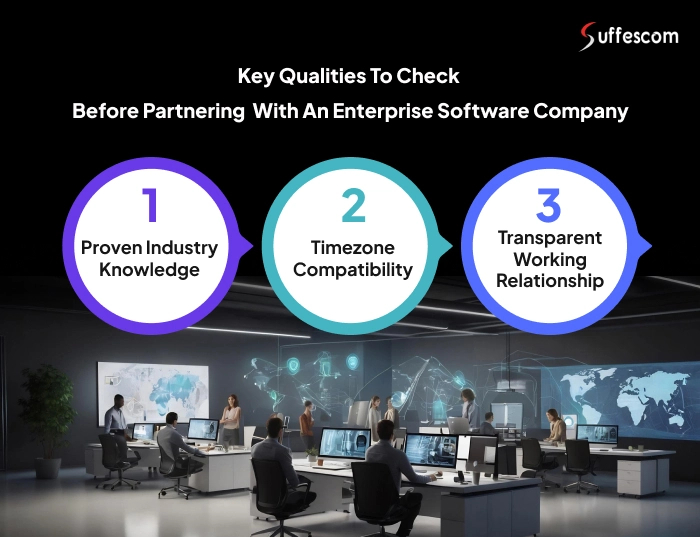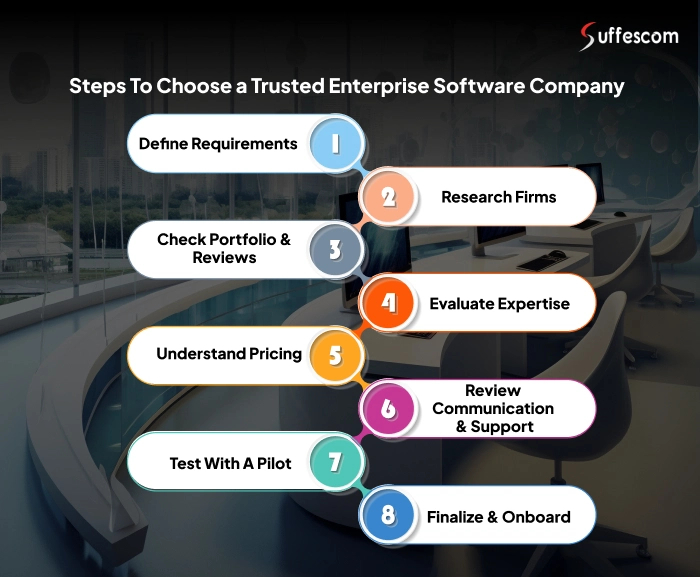Guide to Choose Enterprise Software Development Firm in UAE

The UAE has established itself as the best-driven economy in the MENA region. With government-led digital transformation programs, such as the UAE Vision 2031, the demand for Industry 4.0 practices and smart infrastructure investments increases. It includes a scalable, secure, and customized enterprise software that is all-time high.
Businesses in the UAE, ranging from delivery companies to hospitals, banks, and government offices, are increasingly utilizing software. It helps them work more smoothly, follow local regulations, and stay competitive. In 2024, the UAE enterprise software market generated around USD 3.67 billion, and is expected to nearly double to USD 7.52 billion by 2030. It is growing with a 13.3% CAGR. Meanwhile, the overall software market is projected to grow from USD 5.71 billion in 2024 to USD 11.37 billion by 2030, at around 12% CAGR.
Enterprise Software: A Strategic Necessity
Enterprise software is a core enabler of business growth. Whether it’s automating workflows, managing resources, or analyzing data for decision-making, the right software helps businesses in:
- Boosts operational effectiveness
- Ensure scalability and data security
- Stay compliant with regulations
- Offers the best customer and employee experience
Why Picking the Right Software Development Company is Important
Creating or enhancing enterprise software is a long-term commitment. The company you choose to collaborate has a defining influence on the success of your project. A bad development partner can result in:
- Project delays and cost overruns
- Poor integration with legacy systems
- Security vulnerabilities or compliance issues
- User adoption issues are attributed to bad UX/UI
Additionally a trusted, well-versed development firm has domain knowledge, clear communication, and post-deployment support. It ensures the best software solution that is aligned with your goals. The success of your software project based on who builds it. The right partner helps you make pocket-friendly decisions and ensures that technology becomes a valuable business asset.
This guide is designed to help you make a choice with confidence, so you can partner with a company. It is not just technically skilled but truly aligned with your vision.
What You’ll Learn from This Guide
Choosing the right software development firm isn’t always easy, especially with so many options in the UAE. This guide is here to make that process simpler and smarter for you.
- What qualities to look for in a reliable development partner
- How to compare different companies based on their skills, experience, and local understanding
- What questions to ask before signing a contract
- What common mistakes to avoid during the selection process
- Why regional expertise matters, especially in areas like compliance, data privacy, and user expectations
Understanding Enterprise Software Development
What is Enterprise Software?
Enterprise software is a digital systems that help large-scale organizations to run their day-to-day operations. These are not generic apps or tools for individual users. They are robust, scalable platforms that are customizable according to the unique needs of businesses, government departments, or institutions.
Examples of Enterprise Software:
ERP (Enterprise Resource Planning)
It integrates all the main business processes, such as finance, HR, and supply chain, into one system. Consider the example of SAP and Oracle NetSuite.
CRM (Customer Relationship Management)
It helps businesses in tracking sales and customer interactions to boost service delivery. Take the example of Salesforce and Zoho CRM.
Human Resource Management System
It manages employee records, payroll, leave management, and performance reviews. For example, platforms like Workday or BambooHR allow HR teams to automate their daily tasks.
Bespoke Industry Tools
It includes custom-built solutions for sectors such as logistics, construction, healthcare, and finance. It can address all the challenges related to industries.
Importance of Enterprise Software for UAE Businesses
Things are moving fast. The government’s pushing for digital-first everything, and private companies are racing to keep up. From cloud services to smart infrastructure, the whole landscape is going digital. And enterprise software? It's right at the center of it all.
That’s why many companies are now turning to custom software development company in Dubai UAE that understands regional compliance, offers tailored architecture, and actually aligns with sector-specific challenges.
Market trends in UAE digital transformation
With big national programs such as UAE Vision 2031, the country has made it clear. The vision is to lead the region in innovation. The shift is creating a serious demand for tools that help businesses run smarter.
Take this for example: in 2024, the enterprise software market in the UAE hit $3.67 billion. It’s expected to grow to $7.52 billion by 2030. It is considered a strong signal that businesses are investing in technology that actually works.
Examples of enterprise software in UAE industries
From finance to healthcare, enterprise software is quietly powering the backbone of UAE’s most critical industries:
Finance:
Financial institutions are applying enterprise software to support customer relationships for fraud detection. It ensures compliance with global and local financial laws. Real-time information helps simplify manual effort and improve decision-making. It minimizes manual errors that come from outdated spreadsheets.
Healthcare:
Hospitals and clinics are adopting electronic health records, telehealth solutions, and scheduling to boost patient care. The solutions guarantee enhanced recordkeeping, expedited diagnostics, and secure sharing of sensitive health information. All this is included in one compliance with high standards for data protection.
Government & Public Services:
The government of the UAE has established a worldwide standard for e-governance. With enterprise-grade platforms, public institutions provide services such as digital IDs, licensing, smart city infrastructure, and e-payment systems. It ensures the quicker and more efficient provision of services to citizens and residents.
Real Estate & Construction
Developers, builders, and property managers are utilizing software to coordinate large-scale projects, monitor budgets, track site activity, and streamline procurement. ERP solutions and real estate management software eliminate delays, save money, and enhance transparency through projects.
Why Are Businesses Investing So Heavily?
The answer’s simple: manual processes just don’t cut it anymore. Businesses, whether they’re small logistics firms or large hospital chains need tools that:
- Speed up operations
- Keep them compliant with regulations
- And help them keep up with stiff competition
Without the right systems, they’re stuck dealing with disconnected workflows, slower turnaround times, and rising costs. Not exactly ideal in a fast-moving market like the UAE.
Common Challenges in Enterprise Software Development
Building enterprise software is not that easy. Let’s explore a few common challenges UAE businesses often face:
1. Complexity of Requirements
Enterprise solutions do not fit all sizes. Each organization has its own workflows, compliance standards, and legacy tools. Understanding these requirements is bit critical. Many failed projects in the UAE stem from underestimating this complexity.
2. Scalability & Future-Proofing
As companies grow, so do their software needs grow along with the growth of the company. Users, data, and features must be handled without slowing down. A scalable architecture is an integral part of any product, especially one in sectors such as logistics or fintech, where transaction volumes can spike rapidly.
3. Integration with Current Systems
Most UAE businesses have some legacy software already in place. A new solution has to integrate smoothly to deal with issues such as finance, HR, or supply chain. Inefficient integration results in data silos, manual errors, higher overheads, and increased operational expenses.
4. Data Security & Compliance
The UAE has rigid laws regarding data privacy. It is particularly in industries such as healthcare and finance. Business applications is secured by considering communication, role-based access, and tools such as GDPR, HIPAA for local data residency regulations.
5. Change Management & User Adoption
Even the best-designed software does not work unless employees use it. Enterprise software frequently interrupts current processes and requires retraining staff. Without adequate onboarding, support, and change management, firms risk low adoption and user resistance.
Key Qualities to Check Before Partnering with an Enterprise Software Company

Make sure your tech partner aligns with your vision, timeline, and growth:
Proven Industry Knowledge
Choosing a firm experienced in your sector to understand compliance, workflows, and scalability from day one saves time and risk.
Timezone Compatibility
Real-time availability helps to sort issues faster, streamlines decision-making, and keeps your development process on track without delays.
Transparent Working Relationship
The right partner values feedback, involves you regularly, and builds software aligned with your actual business goals.
Steps to Choose a Trusted Enterprise Software Company

- Define Requirements
- Research Firms
- Check Portfolio & Reviews
- Evaluate Expertise
- Understand Pricing
- Review Communication & Support
- Test with a Pilot
- Finalize & Onboard
Step 1 – Define Your Enterprise Software Project Requirements
Enterprise software is not only about technology; it is about solving real business problems in a smarter way. Before diving into code, the most important thing is to define exactly what you need. Many businesses delve into development with ideas in their mind only. This often leads to confusion and missed deadlines, so getting clarity before starting the business is crucial.
Identify Business Goals and Objectives
Before starting any enterprise software project, it’s crucial to define what the business is trying to accomplish. It sounds good, as many projects lose direction by delving into the technical specifications before understanding the real problems. Whether the goal is to facilitate operations, minimize manual work, or support regional expansion. These objectives guide every major decision that aligns software with wider business goals is strategic. For example, a logistics company planning to scale across the GCC may emphasize multi-location support and real-time tracking.
Key Features and Functionalities to Consider
After setting the goals, the next step is converting them into day-to-day features. It's the right time to pile on features, but every extra functionality adds up cost. The smarter move is to begin with essentials that automate the workflows. Here are three foundational areas to focus on:
1. Scalability
Your business is growing. Your software should be able to keep up without requiring a complete rebuild.
Look for:
- Systems that support more users, locations, or departments down the line
- Modular design that lets you add new features as needed
- Cloud infrastructure (where applicable) that handles workload spikes without lag
Think of scalability as future-proofing. It ensures you’re not forced into another migration 18 months from now.
2. Customization
Off-the-shelf tools often force your team to change how they work. That’s a recipe for low adoption.
Instead, your enterprise system should adapt to you:
- Custom workflows
- Role-based dashboards
- Integrations with tools you already use—whether it’s ERP, CRM, HR, or accounting systems
You don’t need extreme personalization on Day 1. But the system should allow room for tailored adjustments as your operations evolve.
3. Compliance and Security
Especially in industries like finance, real estate, and healthcare, compliance is non-negotiable. The UAE is tightening data regulations, and your system needs to be ready for that.
Look for:
- Access control and user permissions
- Audit logs and data trails
- Encryption standards that align with your industry’s best practices
Budget and Timeline Planning
Planning a budget for enterprise software isn’t just about assigning a number It’s about understanding the full scope of what the project demands. In the UAE, where businesses often operate across multiple cities and sectors, that complexity shows up fast. From integrating bilingual support towards ensuring local compliance consider VAT laws or UAE Central Bank regulations. It helps to start by splitting must-haves from the nice-to-haves. Let’s take an example of a logistics firm that wants to digitize its operations. Real-time tracking, route optimization, and multi-warehouse syncing are critical these days. While AI forecasting tools can wait until the next phase. In other words, don’t try to build everything at once. It’s smarter to budget for a lean, functional launch and grow from there.
Now, about timelines : This is where most teams either overpromise or underprepare. A lot goes on behind the scenes: vendor coordination, backend setup, sandbox testing, even staff training. And if you’re building for the public sector or finance, approvals alone can take weeks. Plus, seasonal considerations like Ramadan or year-end audits can shift timelines more than you’d expect. That’s why UAE companies benefit from realistic, phased planning. Set early checkpoints, leave breathing room for iterations, and keep buffer time for unexpected delays.
Stakeholder Involvement and Requirements Gathering
When building enterprise software, success starts with including key teams for comprehensive requirements. Every department, whether it’s operations, finance, or IT interacts with systems in its own way. If top-level goals are considered, all the crucial day-to-day needs can be considered.
For instance, the IT team considers the integration needs, while customer service could point out gaps in user experience. Businesses uncover the whole picture that deals with real-world workflows, challenges, and expectations. This improves feature planning and helps to avoid delays, rework, or missed expectations later. Workshops, team discussions, or even short surveys help in gathering meaningful insights. It transforms passive users into active contributors so that the software can be more aligned with actual business needs.
Step 2 – Research and Shortlist Potential Enterprise Software Development Firms in UAE
Where to Find Trusted Firms
Identifying a suitable software partner begins with knowing where to find it. In UAE's thriving tech economy, companies start exploring through reputable directories such as Clutch, GoodFirms, or UAE business councils. These websites usually come equipped with vetted client testimonials and portfolios, narrowing down the options to untrustworthy ones. Instead, referrals from business acquaintances or LinkedIn contacts are pure gold. They collaborate with a firm of a similar size or sector. Networking gatherings, Dubai or Abu Dhabi tech exhibitions, and corporate forums can also reveal hidden treasures.
Although websites and well-cooked sales presentations matter, they cannot substitute for first-hand comments. Therefore, mix formal channels with casual sources. Also, narrow down companies with an engaging online presence and thought leadership. If a company is posting valuable insights or sharing helpful content for UAE-based companies, it's usually a good sign of how committed they are to their niche.
Evaluating Firm Expertise and Industry Experience
Not all enterprise software companies are as experienced, and that's where prudent assessment comes into play. Don't look at years in operation. Instead, check out their real-life project list and case studies, particularly those conducted for UAE clients. Did they do compliance for a Dubai-based finance company? Understanding how companies in the UAE adhere to regulatory standards, user conduct, or cultural language specifics can make a significant difference in project success.
Furthermore, established companies don't only produce code; they also pose questions, identify gaps, and deliver tested methods. Additionally, inquire if their staff has experience working with various industries, such as healthcare, education, or property, which demonstrates flexibility. A balanced firm typically will have written processes, mature communication processes, and a history that extends beyond timely delivery.
Assessing Technology Stack and Tools
Choosing the right development firm is essential to building the application according to your needs. A company may have a negative experience if it chooses outdated tools. The software may struggle to scale, integrate, or stay secure. Thus, adapting the right tech stack is mandatory.
Modern frameworks such as .NET, Ruby on Rails, or Node.js are efficient for developing an application. It accelerates development, enables cleaner code, and facilitates easier updates down the road. Similarly, a cloud-native approach like AWS, Azure, or Google Cloud works best for performance and resilience.
What to look for:
- Use of modern, widely supported languages
- Ability to integrate with cloud services
- Flexibility to build custom, modular features
- Familiarity with scalable backend architectures
Verifying Company Certifications and Compliance Standards
Trust is a very big factor in software development, and certifications often help to build it.
Here’s where things get serious. Make sure to partner with a company who says they care about security or compliance. Especially in regions like the UAE, where local laws around data handling, tax systems, and customer privacy aren’t just suggestions—they’re enforced.
A company that invests in audits and certifications usually has internal processes are always reliable. Also, ask how they handle contracts, NDAs, and intellectual property protection. Start with international certifications. ISO 27001 words for data security or ISO 9001 for quality control. These are good indicators that the firm follows structured, audited processes. If they handle any EU customer data even by extension and GDPR compliance also matters.
Also important in a UAE-specific context:
- Knowledge of Emirati data residency laws
- Familiarity with e-invoicing and VAT frameworks
- Experience working under local industry standards, especially in sectors like healthcare or finance
It’s not about collecting badges. It’s about demonstrating that the firm values your business and your customers. If they can explain their processes clearly and even show you sample audit reports or documentation, you’re in better hands.
Step 3 – Analyze Portfolio and Client Testimonials
Reviewing Case Studies Relevant to Your Industry
Before trusting a software firm with your enterprise-level project, take a close look at what they’ve already delivered. A solid portfolio is helpful, but case studies are where the real story unfolds. It’s not just about pretty dashboards or sleek UX, it’s about how the company tackled real business problems.
Consider yourself in logistics. Take a look at case studies where the firm improved delivery times, automated warehousing, or optimized fleet routes. If you’re in healthcare, check that your solution should reduce appointment no-shows or improve data privacy workflows.
The more measurable outcomes, such as reduced processing time by 40%, or “cut costs by 20%”
Checklist while reviewing case studies:
- Do they match your industry?
- Are the challenges and goals clearly explained?
- Did the outcome solve a real problem?
- Is there a quantifiable business impact?
It’s not about seeing a carbon copy of your business. It’s about seeing how they think and how they solve.
Checking Client Reviews and Ratings
While case studies are a company's handpicked success stories, client reviews provide a more candid view. These reviews expose how a firm functions under the actual pressure of projects.
Begin with reliable B2B directories such as Clutch, GoodFirms, and DesignRush, whose reviews are generally verified. It's also possible to find information on websites like Google Reviews, LinkedIn, or even social media forums. Having multiple sources of feedback contributes to a better picture of the reputation of the firm.
While reading feedback, be careful. Do not depend only on star ratings. Pay attention to specific qualities, such as responsiveness, communication, issue handling, and post-deployment support.
Understanding the Firm’s Communication and Project Management Style
Considering how a firm communicates and supervises projects is key to avoiding misunderstandings. Examine how they manage updates, client feedback, timelines, and collaboration tools. Whether Agile, Waterfall, or Hybrid, the process should support transparency, flexibility, and consistent progress throughout the development lifecycle.
Many firms claim to “use Agile,” but this term can may contain different meanings. Do they run weekly stand-ups? Sprint reviews? Do they work in a fully Agile or hybrid model?
Some common approaches include:
- Agile or Scrum – Works well for evolving requirements
- Waterfall – Better for fixed-scope, linear projects
- Hybrid – A flexible mix of both, often seen in enterprise builds
Don’t hesitate to ask about tools. Do they use Jira, Asana, Trello, or something else? Are timelines and deliverables transparent? Do they welcome client feedback during the project or only at milestones?
Step 4 – Evaluate Technical Expertise and Team Composition
Whether you're building an internal dashboard or a large ERP, most companies now demand custom enterprise software in UAE that adapts to their unique workflows and industry needs.
Skills and Experience of Developers
When selecting a software development partner in the UAE, technical knowledge is essential for long-term growth. A well-versed team has the best understanding of frontend, backend, database, and infrastructure tech stack that aligns with business needs.
Availability of Dedicated Teams or Staff Augmentation Options
Another dimension to consider is the way the company builds its delivery model. A few UAE companies like to have a fully managed, dedicated team that takes care of everything end-to-end. Others may already have a built-in team and simply needs a couple of additional things for short period.
Expertise teams work well for long-term projects where focus, continuity, and domain knowledge are important. You’re not just hiring developers; you’re grabbing a cohesive unit that acts as an extension of the business.
Staff augmentation, however, is more fluid. It allows companies to scale up or down according to the project stage. Need someone for 3 months of QA expertise? Or a cloud architect for deployment? Augmentation allows you to fill those gaps, without reshaping your entire internal team.
Things to keep in mind
- Are developers full-time or contract?
- Is there a default project manager or tech lead assigned?
- What's the typical developer retention rate? (High turnover is a bad sign.)
- Do they provide overlap with Gulf Standard Time (GST)? This has an impact on collaboration.
In the UAE business environment, where enterprise timelines tend to shift because of procurement cycles or regulation, flexibility is as important as ability.
Use of Emerging Technologies and Innovation
It's not sufficient for programmers to simply "know the basics"—particularly when innovation is what drives enterprise expansion. UAE businesses in industries such as logistics, fintech, and healthcare technology are increasingly leveraging AI, machine learning, blockchain, and IoT to enhance operations and decision-making.
Collaborate with our Blockchain development company in Dubai
But here's the catch: not all companies that say they "do AI" are actually doing AI correctly. Actual experience manifests in prototypes, production models, and case studies, not a buzzword on a website.
Ask questions like:
- Have they developed AI-driven recommendation engines or chatbots?
- Can they engineer machine learning models for predictive analytics?
- Have they applied blockchain to supply chain visibility or contract verification?
- How do they manage data gathering, model training, and bias prevention?
Embedding these new technologies isn't hype. It's embedding innovation to address true business challenges whether predictive maintenance in real estate, fraud prevention in banking, or smart inventory in retail.
And just for common sense, see if they can embed these tools into your existing stack. Far too often, the issue isn't a lack of innovation; it's subpar integration.
Step 5 – Understand Pricing Models and Contracts
Fixed Price vs. Time & Materials vs. Dedicated Team Models
While choosing a price model for enterprise-class projects. UAE companies have to balance their choices based on project scope, budget flexibility, and urgency.
- Fixed Price works well with well-defined, smaller projects. It provides predictability at the cost of limiting flexibility. Any change in scope typically calls for renegotiation.
- Time & Materials (T&M) is appropriate when the project can change. You pay hourly or by day, allowing room to change direction, but prices can increase if you're not watching closely.
- Dedicated Team Model provides you with a complete team that only works on your project. The model is appropriate for long-term or large enterprise software where priorities change often.
UAE businesses are growing quickly, those regulated in industries such as fintech or healthcare, which provides superior alignment and consistency.
Transparency in Pricing and Avoiding Hidden Costs
Transparent pricing is not just a nice-to-have, it's a matter of budgeting and trust. UAE businesses should demand itemized cost breakdowns before signing anything.
- Ask the vendors ahead of time:
- Are infrastructure costs factored in?
- What about maintenance or support after the launch?
- How is time accounted for in a T&M model?
It's also a good idea to find out if they bill for project management hours, QA testing, or further change requests. Such extra costs usually arise halfway through the project and throw budgets out of whack.
Be careful of ambiguous phrases such as "as needed" or "additional support available." Rather, ask them to define what's part of the scope and what constitutes extra.
Better partners will guide you through cost models, give you flexibility, and even suggest how to allocate budget for maximum value.
In the UAE economy, where businesses typically engage with multi-vendor scenarios, transparent pricing eliminates surprise and fosters long-term relationships based on trust.
Contract Terms, NDAs, and IP Ownership
The legal aspect of software creation tends to be overlooked but that is where companies can lose or win control of their product. UAE businesses need to make sure the contract has air-tight clauses relating to deliverables, deadlines, and ownership.
Begin with the NDA (Non-Disclosure Agreement). It safeguards your concept, business sense, and information. The majority of serious vendors will sign one prior to initiation of discovery.
Next, carefully scrutinize the IP (Intellectual Property) ownership. The code, design, and database must be owned by your company, not the software company. Search for a stipulation that specifically mentions outright IP transfer upon last payment.
Also look at:
- Methods for resolving disputes
- Data management and compliance
- Termination clauses and separation plans
Step 6 – Assess Communication, Support, and Post-Launch Services
Communication gaps and lack of timely support can stall your entire operation. That’s why the best software development firm in UAE won’t just build your product, they’ll guide you through every post-launch phase.
Importance of Clear Communication Channels
Great software doesn't merely result from great code. It results from fantastic communication. That is why knowing how a development company remains in contact throughout a project is as significant as their technical capabilities.
Most enterprise projects in the UAE involve multiple stakeholders. Whether you want regular updates, clear progress reports, and prompt responses. The tools are used whether it’s Slack, Microsoft Teams, Jira, or email-only and how often they provide updates. Some teams offer daily stand-ups, others send weekly digests.
Also, clarify points like:
- Who is your main point of contact?
- Do they offer escalation paths if something stalls?
- How do they deal with scope adjustments or comments during the project?
Companies receptive to live conversations or video calls tend to provide more proactive collaboration than companies that only conduct scheduled check-ins.
Post-Development Support and Maintenance Packages
Software deployment isn't the end goal. It is considered the starting point. Even the most well-constructed platforms need updates, bug fixes, and performance optimization as people use the system in real-world contexts.
Here's what to ask for when it comes to post-launch support:
- Bug fix SLAs (e.g., 24–48 hours for major issues)
- System health monitoring for uptime, security exploits, or downtime
- Upgrade schedules which is particularly for frameworks, APIs, and OS support
- Backup and rollback strategies
Some companies offer 3–6 months of support with their package. Others charge extra, typically by the hour or monthly retainers. Don't find yourself in the dark after the last payment clears.
Check if their support times fit within Gulf Standard Time (GST) to prevent timing delays within working hours.
Training and Knowledge Transfer to Your Internal Team
After software delivery, your internal team must know how to operate it. This section is sometimes skipped but is important for sustainable long-term success. Training is more than a ticklist, it establishes confidence and minimizes future dependencies.
The ideal development partner will offer:
- Admin/user manuals and technical documentation
- Live or recorded training sessions
- A tour of the system architecture
- Handover during the transition period
If you've gone for custom dashboards, role-based access, or specialty integrations, make sure those modules are included in the handover as well.
Step 7 – Conduct Technical Interviews and Pilot Projects
Before you commit to a long-term contract, ensure the development team can talk the walk. A few PDFs or Zoom calls won't provide the complete view—you need to dig deeper.
This is how:
Create a list of project-specific technical questions, not broad ones
Ask them how they'd solve your business use case, not merely how they've solved others
Add scenario-based questions such as:
"How would you guarantee data security for a patient-facing healthcare portal?" or
"How would you design the backend of an e-commerce site for UAE?"
If necessary, invite in your in-house tech consultant or CTO for these rounds. Don't simply test for code, check how they approach problems, handle bottlenecks, and keep themselves current with new technology.
Conducting a Pilot Project or Proof of Concept
If you're investing in a big system, test it first. A pilot project (or Proof of Concept, PoC) will be able to validate assumptions before committing fully.
What does this look like?
- A low-fidelity prototype to experiment with user flows
- A reduced admin panel
- A 2–3 week sprint to create a functional feature
This phase allows you to test:
- Development pace
- Communication flow
- Flexibility in revisions
- Technical fit with your systems
Step 8 – Final Selection and Onboarding Process
How to Compare Final Candidates
If you’ve shortlisted 2–3 vendors, now’s the time to get analytical. Start building a comparison matrix that ranks each firm based on industry expertise, tech stack, cost, client support, flexibility, and response time.You can use tools like Excel, Notion, or even a simple pros and cons table. Just make sure you’re comparing apples to apples.
And don't overlook the intangibles. Which team did you feel was more responsive? Which proposal demonstrated a greater understanding of your company?
A scoring system can come across as "corporate," but it's unexpectedly effective in making a confident choice.
Setting Clear Expectations and KPIs
After choosing the suitable development partner, it's time to align everyone. It involves establishing Key Performance Indicators (KPIs) and clearly defining project milestones.
Your KPIs may include:
- Delivery schedule (e.g., MVP in 10 weeks)
- Bug response time (e.g., <24 hours)
- Uptime commitments (e.g., 99.9%)
- Number of revisions
Also, make it two-way. What's expected from your internal team on communication, approvals, or content delivery?
Transparent KPIs avoid misunderstandings, scope creep, and finger-pointing down the line.
Onboarding Best Practices for Smooth Collaboration
Onboarding does not need to be hurried. A smooth launch establishes the tone for the overall project.
Establish:
- A kickoff meeting with all stakeholders
- Introductions across tech, design, and business teams
- A shared folder for assets, credentials, and documentation
- Clear escalation paths for conflicts or blockers
And yes, define holidays and working hours particularly across time zones. Treat onboarding like an investment. A few days of structured setup can save weeks of confusion later.
Additional Tips for UAE Enterprises
There are several UAE-specific considerations that can significantly impact project success. If you're based in the Emirates, partnering with an enterprise software development company in Dubai can offer better timezone alignment, local compliance assurance .These factors can make long-term engagement:
Understand Local Norms: Many UAE enterprises value formal communication, respect for hierarchy, and bilingual support. Choose a firm that adapts accordingly.
Know the Legal Ground: UAE’s legal framework includes strict rules for IP ownership, data residency, and electronic transactions. Make sure your contract is reviewed by a local business lawyer.
Data Privacy Is a Must: With regulations such as ADGM, DIFC DP Law, and the upcoming UAE Federal Data Protection Law ensure that the vendor is aware and compliant.
Cultural Fit Matters: Firms that work well in GCC markets to understand expectations around deadlines, invoicing, and reporting better than others.
Conclusion:
Choosing the right enterprise software development company in UAE is not only about credentials. It’s about partnership, process, and main alignment with your goals.
From assessing tech capabilities to understanding the pricing models and legal protections, each step plays a crucial role. Take time to compare vendors thoroughly as post-launch support is an important part of the package.
For UAE businesses, they are ready to take the next step. Suffescom Solutions offers localized expertise, flexible engagement models, and a proven record of enterprise-grade solutions.
Choose Suffescom For Enterprise Software Development
Need Tailored Software That Fits Your UAE Business? Suffescom Has You Covered. Get Started!
FAQs
1. What does an enterprise software development firm do?
An enterprise software development company develops customised digital solutions that manage internal workflows and automate routine tasks of organizations. It works closely with business stakeholders to understand operational needs and converts them into robust, secure software systems.
2. How do I choose the best enterprise software development firm in UAE?
It’s crucial to look apart than technical skills. Analyzing firm's track record through case studies and client references, and checking familiarity with local regulations. Furthermore, check their technical stack, monetization model, and the quality of their communication throughout the project lifecycle.
3. What are the benefits of hiring a local enterprise software development firm in UAE?
Working with a local provider provides quicker response times, and a better grasp of UAE-specific compliance and business practices. It facilitates smoother coordination through meetings, especially helpful during complex phases of the project.
4. How is enterprise software development priced in the UAE?
The price varies with the size and scale of your initiative. A minimum system may cost you AED 100,000, whereas a large, full-fledged, feature-based platform may cost you more than AED 1 million.
5. How much time does it take to create enterprise software?
There is no fixed timeline. Some projects take 3-6 months, particularly if they're small and simple. However, if your system has a lot of depth with multiple user roles and integrations, it may take a year or more.
6. Are UAE enterprise software companies capable of cloud migration?
Yes, most UAE companies have specialized cloud teams that monitor migration of the old systems to environments like AWS, Azure, or Google Cloud. It encompasses re-architecture, performance tuning, and provides security throughout and after the migration.
7. What technologies are commonly used by UAE enterprise software development firms?
Technological options are project-specific but typically involve back-end frameworks such as .NET, Ruby on Rails, and Java. For the front-end, React and Angular are favorites, with databases such as PostgreSQL and MongoDB being favorite choices. AI, ML, and blockchain are also used by many companies wherever necessary.
8. Is compliance critical in UAE enterprise software development?
Yes. Adherence to UAE data protection legislation, cybersecurity rules, and industry-specific regulations is not negotiable. One should partner with companies that understand standards like ADGM, DIFC, and local data residency regulations clearly.
9. What post-launch support services do enterprise software firms offer in UAE?
Good firms won’t ghost you after the software goes live. Post-launch support usually includes bug fixes, system monitoring, performance checks, and sometimes even feature upgrades. Just need to check what's included in the contract and what costs extra.
10. Can enterprise software be integrated with existing business systems?
Yes, and it should. Whether it’s your ERP, CRM, or an accounting tool, integration is usually part of the project scope. Just bring it up early so the developers plan for it from day one.
11. What pricing models do UAE enterprise software development firms use?
It's nice to know how pricing is handled before entering into a contract. UAE companies normally provide fixed-price models for well-defined projects, time & materials for adaptable builds, and dedicated team models for extended development collaborations.
12. What advantage does Agile methodology have in enterprise software projects?
If your project specifications tend to change, Agile is a good strategy. It provides ongoing progress monitoring, frequent client feedback cycles, and flexibility all of which enhance project deliverables and decrease time-to-market.
13. Is the UAE startup a good customer for enterprise software companies?
Yes, particularly for those who want to grow fast. Several software companies offer MVP development and scalable architectures tailored to meet startup requirements. With careful planning, even start-ups can gain from bespoke-built enterprise systems.
14. How do I keep my enterprise software project within budget?
Keeping to budget is a matter of Clear requirements, transparent pricing, and regular progress reviews. Seek out companies that provide open estimates and regular meetings so that you can catch scope creep or delays in their making.
15. What are advantages of hiring a local UAE enterprise software development company like Suffescom?
Hiring a company like Suffescom means acquiring a team that knows UAE's regulatory landscape, business culture, and upgraded technology requirements. From compliance to communication, they provide assistance that helps to deliver smoother projects and quicker outcomes.
16. How do UAE regulations influence enterprise software development?
Local laws in the UAE shape how software handles data storage, privacy, and compliance. That’s why choosing a reliable enterprise software development firm UAE ensures your system meets legal and industry standards from the ground up.







